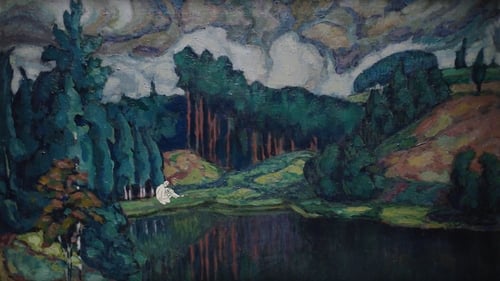
Director of Photography
When love is the greatest torment, will art or play save you? A dramatic documentary about author Vaino Vahing.

Editor
When love is the greatest torment, will art or play save you? A dramatic documentary about author Vaino Vahing.

Producer
When love is the greatest torment, will art or play save you? A dramatic documentary about author Vaino Vahing.

Editor
Marianne Kõrver's documentary is about the life and work of the painter Konrad Mägi (1878-1925). According to the author, when creating the film, she was primarily interested in Mägi's controversial and sometimes inexplicable personality, the various aspects of which are also transferred to his work.

Director of Photography
Marianne Kõrver's documentary is about the life and work of the painter Konrad Mägi (1878-1925). According to the author, when creating the film, she was primarily interested in Mägi's controversial and sometimes inexplicable personality, the various aspects of which are also transferred to his work.

Director
Marianne Kõrver's documentary is about the life and work of the painter Konrad Mägi (1878-1925). According to the author, when creating the film, she was primarily interested in Mägi's controversial and sometimes inexplicable personality, the various aspects of which are also transferred to his work.

Camera Operator
A documentary made for Konrad Mägi exhibition "The Light of the North" in Torino, Musei Reali (2019-2020), about Mägi's life and his legacy.

Director
A documentary made for Konrad Mägi exhibition "The Light of the North" in Torino, Musei Reali (2019-2020), about Mägi's life and his legacy.

Cinematography
Tõnu Kõrvits is a composer in his fifth decade who doesn’t open up easily. Though he is one of the most performed Estonian composers, Tõnu prefers to remain in the shadows. His person and music carry a secret that only unravels for those who can see behind the words, who forget themselves in the music and let the sounds Tõnu created take them along on a mystical, poetical journey that changes anyone who arrives at the end. The film “Moorland Elegies” is named after Tõnu’s nine-part choir cycle, based on Emily Brontë’s almost gothic, dark poetry, that invokes spiritual conditions delicately translated into natural imagery. Tõnu’s enchantingly powerful “Moorland Elegies” has been one of the most sold classical records on the Amazon charts and forms the musical and material core of the film. This is a film about a composer, his music and the people who are deeply touched by his music.

Screenplay
Tõnu Kõrvits is a composer in his fifth decade who doesn’t open up easily. Though he is one of the most performed Estonian composers, Tõnu prefers to remain in the shadows. His person and music carry a secret that only unravels for those who can see behind the words, who forget themselves in the music and let the sounds Tõnu created take them along on a mystical, poetical journey that changes anyone who arrives at the end. The film “Moorland Elegies” is named after Tõnu’s nine-part choir cycle, based on Emily Brontë’s almost gothic, dark poetry, that invokes spiritual conditions delicately translated into natural imagery. Tõnu’s enchantingly powerful “Moorland Elegies” has been one of the most sold classical records on the Amazon charts and forms the musical and material core of the film. This is a film about a composer, his music and the people who are deeply touched by his music.

Director
Tõnu Kõrvits is a composer in his fifth decade who doesn’t open up easily. Though he is one of the most performed Estonian composers, Tõnu prefers to remain in the shadows. His person and music carry a secret that only unravels for those who can see behind the words, who forget themselves in the music and let the sounds Tõnu created take them along on a mystical, poetical journey that changes anyone who arrives at the end. The film “Moorland Elegies” is named after Tõnu’s nine-part choir cycle, based on Emily Brontë’s almost gothic, dark poetry, that invokes spiritual conditions delicately translated into natural imagery. Tõnu’s enchantingly powerful “Moorland Elegies” has been one of the most sold classical records on the Amazon charts and forms the musical and material core of the film. This is a film about a composer, his music and the people who are deeply touched by his music.

Producer
Tõnu Kõrvits is a composer in his fifth decade who doesn’t open up easily. Though he is one of the most performed Estonian composers, Tõnu prefers to remain in the shadows. His person and music carry a secret that only unravels for those who can see behind the words, who forget themselves in the music and let the sounds Tõnu created take them along on a mystical, poetical journey that changes anyone who arrives at the end. The film “Moorland Elegies” is named after Tõnu’s nine-part choir cycle, based on Emily Brontë’s almost gothic, dark poetry, that invokes spiritual conditions delicately translated into natural imagery. Tõnu’s enchantingly powerful “Moorland Elegies” has been one of the most sold classical records on the Amazon charts and forms the musical and material core of the film. This is a film about a composer, his music and the people who are deeply touched by his music.

Waitress
В поисках ответов на риторические вопросы Тони блуждает по жизни. Кто хороший человек, а кто плохой? Что такое мораль и этика?

Director of Photography
Kristiina Davidjants' documentary "In Search of Nipernaadi" was completed almost a quarter of a century after the premiere of the feature film "Nipernaadi". Actors and members of the film crew recall the birth story of the legendary film and share their thoughts. This was one of the last interviews for the film's director Kaljo Kiisk.

Writer
The 6 short films of "Tabamata ime" are based on Edward Vilde's play of the same name first published in 1912. Vilde's play is about a young piano player Leo Saalep, who returns to his homeland Estonia to give a concert, and whose alleged international breakthrough has given him the long awaited role of putting Estonian culture on the map in the eyes of the local culture elite.

Director
The 6 short films of "Tabamata ime" are based on Edward Vilde's play of the same name first published in 1912. Vilde's play is about a young piano player Leo Saalep, who returns to his homeland Estonia to give a concert, and whose alleged international breakthrough has given him the long awaited role of putting Estonian culture on the map in the eyes of the local culture elite.















